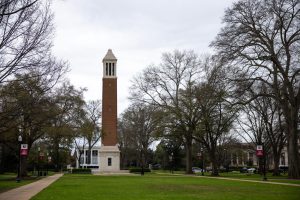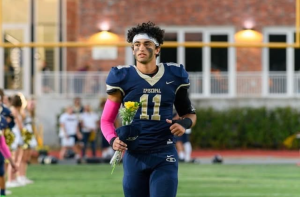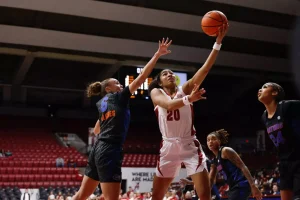Top students should choose state schools over the Ivy League
October 11, 2018
My senior year of high school, a fellow classmate of mine who was going to an Ivy League school to play a sport told me he was going to get somewhere in life, and that the rest of us who were just going to state schools would get nowhere.
This individual, who rarely did homework and complained if any teacher gave him an assignment on the day of a basketball game, had a friend who worked extremely hard. This friend, although he was student body president, a top speech and debate competitor and a devoted student, got rejected from the Ivy League schools.
Thus, I wonder: Can an Ivy League school really get you farther in life than a public university, and if that is the case, what is the fate of the extremely talented students who do not have the opportunity to attend schools with the lowest acceptance rates in the country?
When asked about the benefits of an Ivy League education, most people explain the high test score averages, the high employment rate and the overall benefit of being surrounded by people who will push you to be smarter or better. I argue, though, that selectivity does not equal quality, that employers would rather hire students who can work and communicate well with all types of people than just Ivy League graduates and that the constant desire to be better only diminishes the character and vitality of a person in the long run.
According to U.S. News, the Ivy League consists of Brown, with an acceptance rate of 9 percent; Columbia, with an acceptance rate of 6 percent; Cornell, with an acceptance rate of 13 percent; Dartmouth, with an acceptance rate of 10 percent; Harvard, with an acceptance rate of 5 percent; the University of Pennsylvania, with an acceptance rate of 9 percent; Princeton, with an acceptance rate of 6 percent; and Yale, with an acceptance rate of 7 percent.
Furthermore, according to Business Insider, the cost of attendance for these schools is over $60,000 a year, while according to U.S. News, the cost of attendance for the top-ranked public universities – University of California Los Angeles, University of California Berkeley, University of Virginia, University of Michigan Ann Arbor and University of California Santa Barbara – is at or below $17,000 for in-state residents.
Only a small fraction of the population can afford such steep prices or qualify for financial aid, since Ivy Leagues do not give merit-based scholarships. Additionally, state schools give financial aid as well as merit-based scholarships, allowing students to get their money’s worth, so to say.
The quality of an Ivy League education is undeniably good, but many state universities boast the best programs in the nation and the best professors, especially those with well-developed honors colleges, which provide small classroom settings ideal for discussion-based classes, more allotted attention from each faculty member to their students, and thus, a better education at little additional cost.
Furthermore, the extremely high costs of attendance for Ivy League schools force many students into student debt, meaning their potentially higher-paying salaries for their first jobs will be used to pay back the schools they attended – not for them to enjoy, put to good use or save.
According to the Institute for College Access and Success, only 66 percent of public-university students graduated with student debt (presumably, mostly out-of-state students as indicated in The New York Times article “Public Colleges Chase Out-of-State Students, and Tuition”), while 75 percent of students graduating from private universities had student loans to pay.
While many parents argue they want their children learning in an environment surrounded by other highly intellectual people, the diverse intellectual experience, backgrounds and interests present in public universities make for an enriching learning experience, whether it be inside or outside of the classroom.
While these are generalizations, for the most part all Ivy League students got perfect scores on their SAT and ACT, had perfect resumes showing the variety of interests and leadership roles necessary to get into the school, graduated at the top of their class and started their own business or non-profit organization.
These students, while they may have different resumes from one another, still have the perfect combination of activities, work experience and leadership necessary to get into the Ivies; in other words, everyone seems perfect, making school and life in general more cut-throat and competitive.
In my opinion, people who worked extremely hard in high school solely to get into the perfect college cannot teach you how to become a better person. Rather, if you’re a good student, surrounding yourself with people whose sole focus isn’t fitting into the ideal college-acceptance mold can be more beneficial to your personal development.
Intellect goes a long way, but more than that, communication skills and character set people apart in the job market. According to Forbes Magazine, one of the qualities employers value most in potential employees is their ability to work well with others, and if Ivy League students can only work with or only want to work with people who were afforded the same educational opportunities they were, sharing a similar attitude to that of my high school classmate, then they won’t do well in finding and sustaining a job. The Ivy League name brand may get them their first jobs, but after that, their personal skills will be the determining factor–did they learn to cultivate those in the Ivies?
Still, the main advantage of a state university is the impact that education will have on your character and vitality of self because if a person is constantly stressed and unhappy, they will probably encounter depression or anxiety, according to the Mayo Clinic.
No matter how much money a person makes, nothing will be able to replicate or supplement for that person’s happiness. According to Town and Country Magazine, of the top ten colleges with the happiest student bodies, four of those schools were public universities, and none of those schools were Ivy Leagues. Additionally, according to the Huffington Post, four out of the ten colleges with the most stressed students were Ivy Leagues.
In summation, author and teacher William Deresiewicz said in an interview with The Atlantic journalist Lauren Davis that “[Ivy League students] are kids who have no ability to measure their own worth in any realistic way—either you are on top of the world, or you are worthless.”
Above all, personal happiness is the most vital resource by which one can achieve success for him or herself. Thus, I don’t think the Ivy League is worth the emotional and monetary costs that it requires for students to achieve a societal standard of worth.









